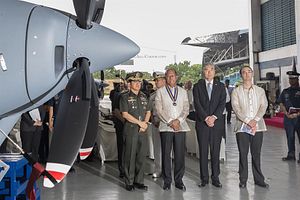This week, the United States announced that it had begun deploying a more capable unmanned aircraft system in the Philippines to help its oldest Asian ally fight terrorism. The move marked yet another step in Washington’s ongoing effort to boost the capabilities of the Armed Forces of the Philippines (AFP) as they confront the rising threat from the Islamic State made clear by the ongoing siege of Marawi City by militants that broke out in May.
As I have noted before, despite the occasional hype that has emerged about the U.S. surveillance activities since Duterte came to office, Washington in fact has had a longstanding presence in the Philippines, and part of that has involved assisting with surveillance capabilities that Manila does not have and badly needs (See: “What’s Behind the New US-Philippines Drone Hype Under Duterte?”).
That continues up to today. Officially, Philippine defense officials have publicly said there are a group of 107 U.S. soldiers conducting surveillance operations in Zamboanga, Basilan, Sulu, and Tawi-Tawi, using both aircraft as well as drones, even though their role is limited to just deploying those surveillance assets to areas the AFP is identified rather than authorizing strikes or directly engaging in combat operations.
The United States has also been stepping up its provision of surveillance assets to the Philippines as part of broader assistance for counterterrorism, from drones such as the Aerovironment RQ-11 Raven hand-launched UAVs for use of the Marine Special Operations Group to the new Cessna 208B “Caravan” ISR aircraft (See: “US Terror Aid to the Philippines Signals Enduring Defense Ties Under Duterte”). Philippine defense officials had also been indicating through the summer that more was already in the works in this respect.
On September 11, the U.S. Embassy in Manila said that to further support Philippine counterterrorism efforts in Mindanao, it would now deploy the Gray Eagle Unmanned Aircraft Systems (UAS) there.
The symbolism of the move, which came during the anniversary of the September 11, 2001, terrorist attacks that had led to Southeast Asia’s role as the ‘second front’ in the George W. Bush administration’s so-called war on terror, was not missed on observers.
But the deployment is also significant substantively. Gray Eagle, which is manufactured by General Atomics Aeronautical Systems, is a medium-altitude, long-endurance (MALE) UAS, with an endurance of 25 hours of operations and a service ceiling of 29,000 feet. Its longer flight duration relative to other surveillance platforms being used in the region, as the embassy pointed out in a statement, would enable for a larger area of reconnaissance and surveillance.
As I have pointed out before, Philippine defense officials have been quite candid about their urgent and dire need for vastly better surveillance, particularly amid the Marawi crisis (See: “Battle for Marawi Exposes Philippines’ Military Intelligence Crisis”).
































